2014年3月2日托福口语预测机经
托福阅读真题详解 2014-03-16 01 Costs and Benefits of Social Life

animals can. Solitary animals can hide from predators more easily than groups of animals can. Solitary animals do not need to spend time and energy competing for social status. Solitary animals do not need large quantities of food to survive. 细节题:
4. According to paragraph 3 which of the following is likely to increase when animals live with other members of their species rather than alone reproductive success unpredictable behavior among males resistance to disease competition for food 细节题: 回到文中可以看到主要内容是:sociality has two other potential disadvantages. The first is heightened competition for food;The second is increased vulnerability to parasites and disease, which plague social species of all sorts. 回到选项只有 D 是对的
2014年雅思机经写作

2014上半年雅思机经—写作篇南昌环球雅思写作名师Marqe2014年1月9日A类Task1-table,the statistics on age income and prenty in three states in USA in 2000,A类Task 2-交通问题类Traffic is becoming more and more crowded. The best way for government to solve the traffic congestion is to provide free public transport 24 hours a day, 7days a week. To what extent To what extent do you agree or1 / 511 / 51disagree?2014年1月11日A类Task1-diagram-玻璃瓶子的制造,A类Task2-年青人就业问题Many young people choose to change their job after few years, what are the reasons and does disadvantage overweight advantage?2014年1月18日A类Task1-综合图=线形+柱状图,讨论一个theatre的tickets price 和sales percentage (line grah-average price of tickets at a theater+ bar chart-average percentage of2 / 512 / 51tickets sold),A类Task2-孩子教育问题Why children do not concentrate and focus in school? Discuss reasons and what do you think can solve this problem.2014年1月25日A类Task1-饼图percentage of the day working adults spent doing different activities,A类Task2-国际环境保护问题The international community should immediately reduce the consumption of3 / 513 / 51fossil fuels of all countries. To what extent do you agree or disagree?2014年2月1日A类Task1-线图the percentage of students choosing different types of courses in a college in 1985 to 2005,and It also makes a forecast of 2015,A类Task2-建立快乐和谐社会问题The best way to produce a happier society is to ensure that there are only small differences between the richest and the poorest members. To what extent do you4 / 514 / 51agree or disagree?2014年2月13日A类Task1-小作文表格,关于一个建筑3年收入、支出,利润的对比。
历年高口NTGF原文真题
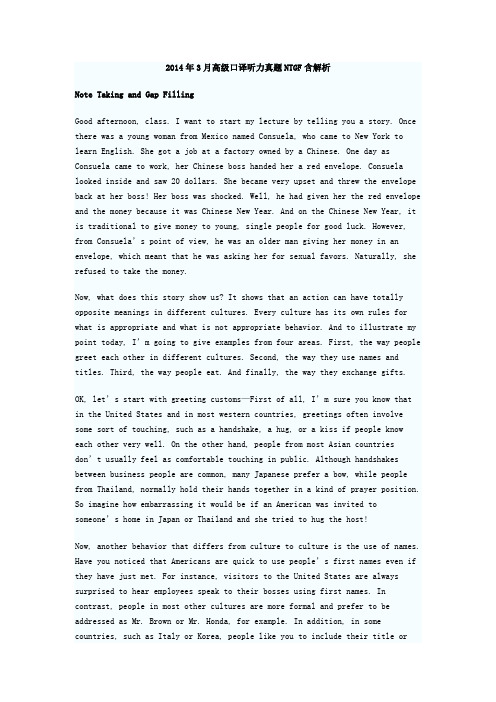
2014年3月高级口译听力真题NTGF含解析Note Taking and Gap FillingGood afternoon, class. I want to start my lecture by telling you a story. Once there was a young woman from Mexico named Consuela, who came to New York to learn English. She got a job at a factory owned by a Chinese. One day as Consuela came to work, her Chinese boss handed her a red envelope. Consuela looked inside and saw 20 dollars. She became very upset and threw the envelope back at her boss! Her boss was shocked. Well, he had given her the red envelope and the money because it was Chinese New Year. And on the Chinese New Year, it is traditional to give money to young, single people for good luck. However, from Consuela’s point of view, he was an older man giving her money in an envelope, which meant that he was asking her for sexual favors. Naturally, she refused to take the money.Now, what does this story show us? It shows that an action can have totally opposite meanings in different cultures. Every culture has its own rules for what is appropriate and what is not appropriate behavior. And to illustrate my point today, I’m going to give examples from four areas. First, the way people greet each other in different cultures. Second, the way they use names and titles. Third, the way people eat. And finally, the way they exchange gifts.OK, let’s start with greeting customs—First of all, I’m sure you know that in the United States and in most western countries, greetings often involve some sort of touching, such as a handshake, a hug, or a kiss if people know each other very well. On the other hand, people from most Asian countriesdon’t usually feel as comfortable touching in public. Although handshakes between business people are common, many Japanese prefer a bow, while people from Thailand, normally hold their hands together in a kind of prayer position. So imagine how embarrassing it would be if an American was invited to someone’s home in Japan or Thailand and she tried to hug the host!Now, another behavior that differs from culture to culture is the use of names. Have you noticed that Americans ar e quick to use people’s first names even if they have just met. For instance, visitors to the United States are always surprised to hear employees speak to their bosses using first names. In contrast, people in most other cultures are more formal and prefer to be addressed as Mr. Brown or Mr. Honda, for example. In addition, in some countries, such as Italy or Korea, people like you to include their title orposition with their family names, especially if they’re university graduates or owners of a business.Now I want to look at eating customs. I’ll talk about the behaviors connected with eating that vary from culture to culture. One of these is the use of utensils. You probably know that people in many Asian cultures use chopsticks but in some countries i t’s customary to eat with your fingers. It’s important to be aware of different dining customs. Here is another example. In some cultures, eating everything on your plate is considered impolite. In Egypt and China, you should leave some food in your dish at the end of the meal. This is to show that your hosts were generous and gave you more than enough to eat. However, Americans generally consider a clean plate as a sign of satisfaction with the food.Finally, what I want to mention today is gift giving, which you may think is a universal custom and there is not much variation from culture to culture. But the rules of gift giving can be very complicated. In USA, if you’re invited to someone’s home for dinner, bring wine or flowers or small item as a present. On the other hand, the Japanese give gifts quite frequently, often to thank someone, such as a teacher or a doctor. In the Japanese culture, gift giving is a very ancient tradition and it has many detailed rules. Another interesting fact about gift giving is that many cultures have strict rules about gifts you should not give. For example, never give yellow flowers to people from Iran, which means you hate them!【评析】本文题材对考生来说并不陌生,是老生常谈的文化差异。
2014第三季度雅思口语考情分析
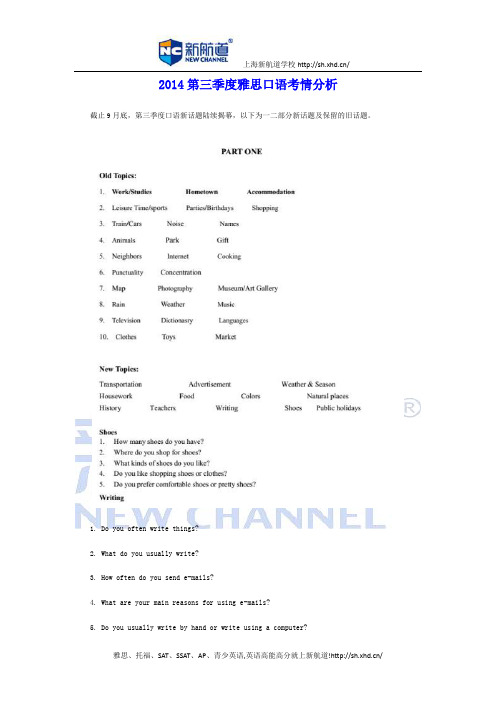
2014第三季度雅思口语考情分析截止9月底,第三季度口语新话题陆续揭幕,以下为一二部分新话题及保留的旧话题。
1. Do you often write things?2. What do you usually write?3. How often do you send e-mails?4. What are your main reasons for using e-mails?5. Do you usually write by hand or write using a computer?6. Do you think computers might one day replace handwriting?7. Do you think handwriting is very important (nowadays)?8. How can children today improve (or, practice) their handwriting?9. What impression does a person's handwriting have on other people? Teachers1. Do you like your teachers?2. What do you think of your teachers?3. Do you think it's important to like your teachers?4. What qualities should a good teacher have?5. When you were in school, did your teacher have a influence on you?6. Do Chinese students like their teachers?History1. Do you like (to learn about) history?2. Do you think history is important?3. Does China have a long history?4. Do you think you can learn history from films or TV programs?5. Do you think the internet is a good way to learn about history? Colors1. What's your favorite color?2. Do you usually wear clothes in your favorite color?3. Are there any colors that have a special meaning in your country?4. Do people care about the color of their clothes?5. Do you think the color of one's clothes is important?6. Do you think color is important in daily life?7. Are there any colors you dislike?Food1. Which do you prefer to eat, lunch or dinner? (Why?)2. Do you think there are any benefits from eating breakfast?3. Are you willing to try some new food?4. Which do you prefer – to eat one big meal or to eat several small snacks?5. What do you consider to be a healthy diet?6. Do you know how to make (prepare) a meal?Housework1. Do you usually do any housework?2. Do you like to do housework?3. What housework does you least like doing?4. Do you think it's important for children to do some housework?5. Have there been any changes in the housework people do?Weather & Season1. What's the weather usually like in your country (or, your hometown)?2. How is the weather here different to the weather in your home country?3. Would you say the weather in your hometown is suitable for working (or studying)?4. Would you like to move to a place with different weather?5. What sort of weather do you like the most?6. What season do you like best?7. What do you do in that season?8. What season (or weather) do you think is most suitable for work and/or study?9. Has the weather in your country changed much in the past few years?10. Do you prefer hot or cold weather?11. Do you (usually) pay attention to the weather forecasts?Advertisement1. Do you like advertisements on TV?2. What kind of advertisement do you like the most?3. Why do you think there are so many advertisements now?4. What are the various places where we see advertisements?5. How do you feel about advertisements?6. Do advertisements (ever) influence your choice about what to buy?Transportation1. How did you get to the test today?2. Why did you choose that form of transport?3. Do you often use public transportation?4. What kind(s) of transport do you usually use?5. For you, what are the benefits (advantages) of using that form of transportation?6. Is transportation very important where you live?7. What's the most common means of (= form of) transport in your hometown?8. What do you think of the transport conditions in your hometown?9. How do you think the transport system could be improved?Natural holidays1. What public holidays do you have in your country?2. Do people in your country celebrate Christmas?3. Do you like public holidays?4. Which public holidays do you like to most?5. What did you do during the last public holiday?6. What do other people in your country usually do on public holidays?7. What would you like to do during the next public holiday?8. Do you think holidays are important?9. Do you think there should be more public holidays in your country?Natural places1. Do you like visiting natural places?2. What are some well-known natural attractions in your country?3. Have you ever gone camping?4. How do city kids in your country have contact with nature?5. Do you have any memories of nature from your childhood?6. What are the benefits of learning about nature?PART TWONew Topics:People:1. Describe a person who you wanted to be similar to when you were a teenager2. Describe an old person you respect3. Describe someone you think is beautiful or handsome4. Describe a famous sports star or a singer/band you likeObjects:1. Describe a TV/radio program that you like to talk about with others2. Describe one of your friend’s habits you want to develop3. Describe a useful APP4. Describe a public activity that keeps you healthy5. Describe an important job in your country6. Describe a gift that you made by hand for your friend7. Describe something you want to learn but can’t now8. Describe a prize you wonEvents:1. Describe a long journey that you had2. Describe something you did that was a waste of time3. Describe an occasion when you borrowed something form others4. Describe a meal you invited others to your home or a restaurant5. Describe a period of time you spent far away from your home6. Describe an interesting conversation you had with others7. Describe an occasion when you waited for someone8. Describe a thing that you did with a group of people9. Describe a situation when you experienced a long traffic jamOld Topics:People:1. Describe a friend who you had at school2. Describe a family member who you spend the most time with.3. Describe someone you know who has an interesting job.4. Describe a famous person (still living), not from your country, who you would like to meet.Objects:1. Describe a book/magazine that you enjoyed reading2. Describe a good/popular law in your country.3. Describe an interesting wild animal from your country (you like best).4. Describe sth special that you saved money to buy.5. Describe sth you bought but don’t use so often.6. Describe your first mobile phone.7. Describe a foreign film you enjoyed.8. Describe a good photo someone took for you.9. Describe another language (in addition to English and you own mother tongue) that you would like to learn.10. Describe an antique or some other old thing that your family has kept for a long time.11. Describe an indoor game (not about sport) you enjoyed when you were a child.12. Describe sth special you brought home from a holiday.13. Describe a problem with a piece of equipment that you can’t solve.Place:1. Describe a beautiful place where you want to have a home / Describe a home (e.g., flat or house) that you would like to live in.2. Describe a city that you have visited (that left an important impression on you).3. Describe a school you have attended in your childhood.4. Describe an important/historic building in your hometown.5. Describe a place away from home where you stayed.6. Describe a place in the world that you would like to travel to at the first time.Events:1. Describe an event that changed your life in a good/positive way.2. Describe a success your friend has had that you are proud of.3. Describe a situation when you received some useful advice.4. Describe a neighbor you ever helped.5. Describe a family celebration (such as wedding) that you attended.6. Describe an important letter (that) you received.7. Describe sth that you have shared with others (or another person).新航道雅思备考建议其实Part one出现的新题中,Transportation, Weather & Season, History是曾经出现过的话题, 而Advertisement, Food分别是由part two的An Successful Advertisement转换成part one话题和由原part one的cooking转换出来的话题。
2014年3月2日托福考试回忆与答案
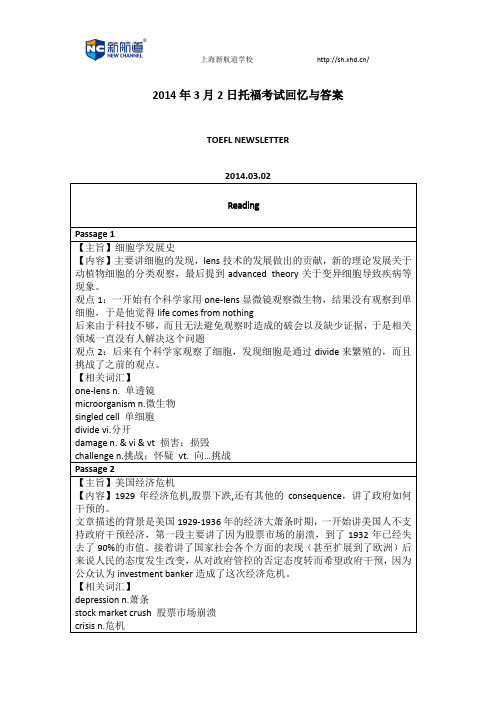
2014
TOEFL NEWSLETTER
2014.03.02
Passage 1
【主旨】细胞学发展史
【内容】主要讲细胞的发现,lens技术的发展做出的贡献,新的理论发展关于动植物细胞的分类观察,最后提到advanced theory关于变异细胞导致疾病等现象。
观点1:一开始有个科学家用one-lens显微镜观察微生物,结果没有观察到单细胞,于是他觉得life comes from nothing
【内容】西班牙的长篇史诗和短诗,长篇留下来的只有几首,而短诗保存完好,有很多。长篇有4000多行,举的例子是描述一次战争,它从事情的中间开始叙述,不知道是叙述手法还是因为确实是前面的部分;而短篇只有十余行。后来的人用短篇里的内容来填补长篇里缺失的部分,而且短篇往往将的是长篇的climax部分。
有学生提问短篇是完全cut from长诗么,还是只是被长篇inspired。教授说两种可能都有。
【相关词汇】
coHale Waihona Puke d-blooded adj.冷血的
warm-blooded adj.恒温的
living-condition生活环境
body size体型
buffer vt.缓冲
2014年3月全国英语等级考试二级听力真题(含录音原文及答案)
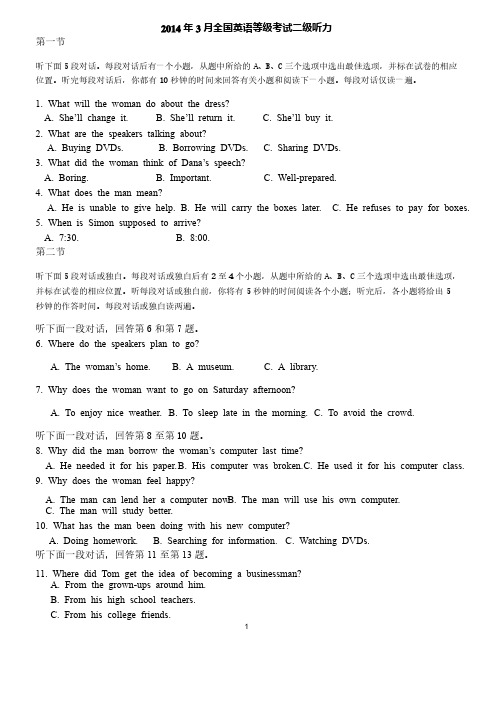
1 2014年3月全国英语等级考试二级听力第一节听下面5段对话。
每段对话后有一个小题,从题中所给的A 、B 、C 三个选项中选出最佳选项,并标在试卷的相应位置。
听完每段对话后,你都有10秒钟的时间来回答有关小题和阅读下一小题。
每段对话仅读一遍。
1. What will the woman do about the dress? A. She’ll change it. B. She’ll return it. C. She’ll buy it. 2. What are the speakers talking about? A. Buying DVDs. B. Borrowing DVDs. C. Sharing DVDs. 3. What did the woman think of Dana’s speech?A. Boring. B. Important. C. Well-prepared. 4. What does the man mean? A. He is unable to give help. A. He is unable to give help. B. He will carry the boxes later. B. He will carry the boxes later. C. He refuses to pay for boxes. 5. When is Simon supposed to arrive? A. 7:30. B. 8:00. 第二节听下面5段对话或独白。
每段对话或独白后有2至4个小题,从题中所给的A 、B 、C 三个选项中选出最佳选项,并标在试卷的相应位置。
听每段对话或独白前,你将有5秒钟的时间阅读各个小题;听完后,各小题将给出5秒钟的作答时间。
每段对话或独白读两遍。
听下面一段对话,回答第6和第7题。
6. Where do the speakers plan to go? A. The woman’s home. B. A museum. C. A library. 7. Why does the woman want to go on Saturday afternoon? A. To enjoy nice weather. B. To sleep late in the morning. B. To sleep late in the morning. C. To avoid the crowd. C. To avoid the crowd. 听下面一段对话,回答第8至第10题。
2014年3月2日托福写作机经

2014年3月2日托福写作机经上海环球雅思今天,环球雅思的小编为大家带来了2014年3月2日托福写作机经,供大家参考使用。
环球雅思将与您分享更多考试资讯!Writing SectionTask 1 Integrated Writing本次托福综合写作部分,围绕着Shark with hammer-shaped head(锤子头鲨鱼)主题展开,话题关键词为There is a kind of shark with hammer-shaped head. The special shaped head functions in three ways。
听力材料和阅读材料依旧遵循了驳斥与被驳斥的论述套路,论据与例证清晰,对等关系明确,两篇材料整体上没有给考生搭建文章架构造成明显干扰,难度处于intermediate level。
篇章回忆主要观点: The special shaped head functions in three ways.分论点1:First, shark with such shaped head turns around quickly.分论点2:Second, such head helps improve the shark’s sensitivity toelectricity field.分论点3:Third, the head can be used as weapons to hunt prey.小贴士考生在读完阅读材料,开始听力笔记之前,非常重要的一个步骤是对已提炼出的要点,按照考试规律性套路进行预测及拓展。
换言之,在该部分写作任务中,ETS基本上已经摈弃听力材料正面支持和补充论证阅读材料的出题思路。
按照这一规律,考生可以按照综合写作的“一一对应,三三驳斥”原则对每一个要点进行头脑风暴,力求在有限的时间内,为更准确有效的抓取听力材料的关键论点,做好系统详尽的笔记做准备。
2014年3月15日托福口语机经
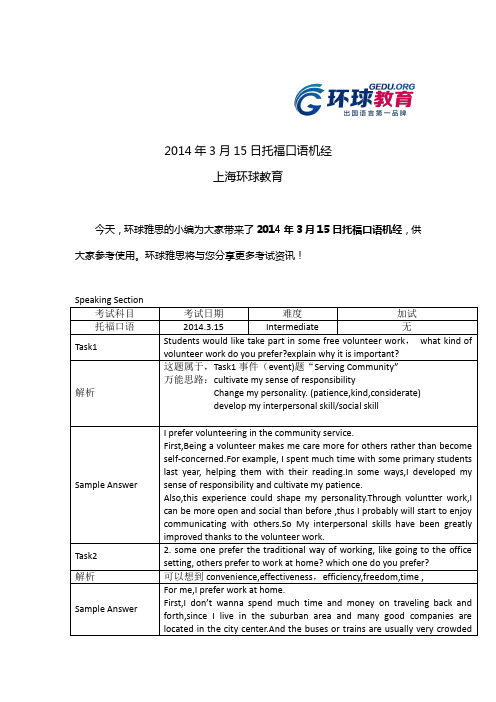
阅读
plan:university will no longer serve poetry writing course
R1:class small, enrollment decline,not worthwhile
R2: student can take a similar class in state univerቤተ መጻሕፍቲ ባይዱity
听力
man: he thinks it's terrible
R1:就是因为人少才更加的worthwhile,因为你就可以more attention from professor, get importantfeedback,而individual talk with professor是important的大班的话they cannot learn that much.
Besides, I will feel more free and the time is more felxible when I am working at home,because there won’t be anyone ,especiallymy boss, monitering or watching me during the work time.
R2: state university不方便,own car的还行,需要花费more than 1 hours on the bus, for student who takes public transportation is inconvenient.
Task4
阅读
releaser:一种initiated的behavior天生不用学的通stimulate来发生的
- 1、下载文档前请自行甄别文档内容的完整性,平台不提供额外的编辑、内容补充、找答案等附加服务。
- 2、"仅部分预览"的文档,不可在线预览部分如存在完整性等问题,可反馈申请退款(可完整预览的文档不适用该条件!)。
- 3、如文档侵犯您的权益,请联系客服反馈,我们会尽快为您处理(人工客服工作时间:9:00-18:30)。
2014年3月2日托福独立写作都会考到哪些题目?国内某知名出国语言培训机构带来2014年3月2日托福独立口语预测,希望对托福考生有所帮助。
2014年3月大陆地区托福预测2010.10.09Do you think success is important, or it is more important to remain happy and optimistic when you fail2012.12.08Patience is not a good strategy;we should take action now rather than later2010.09.26Do you agreeor disagree:Technologyhelps to make people's lives simpler or make people's lives more complicated.2012.11.18Some people think that the important role of university professors is to do research , others think the main role of them is to educate students.improvement of school isthe most important factor for development of nation2008.12.13spend money on long last thing or spend on short-term pleasure; e.g. buying jewerly or taking vacations.NA2012.11.16government should support artist or artist ahould support themselvesNA2012.06.08Should company use public recognition to reward hard working, not to use moneyNA2012.12.07teaching is a harder work in the past than today2010.09.12Agree or disagree: people should not have to pay for the public transportationIs it easier to be a success in the past than it is today 2010.12.12Being creative,rathar than carefully planning,is more often results in the best solution.NA2012.10.27现在的年轻人比以前更愿意自己做决定了,不会太依赖家长。
NA2012.05.25Is there a good reason to be impolite(rude) to another person?2012.10.28The government and corporation should share all their scientific discoveries with other countries in the world?2012.02.11do you agree or disagree the follow statement: one can not learn to be a leader.是完全按照领导指示行事的员工对公司更有价值还是一直寻找新的途径解决问题的员工对公司更有利?NA2012.08.04Do you think teachers have greater influence on young children in the past than today?2010.06.13it is better to spend money on traveling and vacation than save money for the future.2008.06.22是不是最重要的提高health care的措施是治理环境问题2009.12.20The ability to read and write is more important now than in the past.2011.08.27People who develop many different skills are more successful than people who focus on one skill only.improvement of school isthe most important factor for development of nation 同意么2014年3月2日托福独立口语都会考到哪些题目?中国某知名出国语言培训机构给您带来2014年3月2日托福独立口语预测,希望对托福考生有所帮助。
2014年3月大陆地区托福预测:2012.09.081. Do you agree students to have pet in dorm2. it is an essential part to let children go to outside such as museum and zoo to study 而不只是在教室学。
2013.05.261. 2013.07.21已考2. Do you agree or disagree that teachers should encourage students to have class discussions during class?NA2012.05.051 如果学校图书馆里面所有的纸质的书换成电子书好不好?2 Government该不该spend money on encouraging citizens to leada healthy lifestyleNA2012.11.161 是否喜欢和长辈(叔叔阿姨爷爷奶奶)聊天2 家具或小家电坏了是自己修还是拿到店里修1 decribe a charater in a book,film , poem, explain why you like it.2 2013.09.01已考2012.12.081.如果一个外国朋友要来你的国家读大学你会给神马建议。
2. 2014.02.22已考2008.12.131. 2014.02.22已考2.part-time job/ summer employment是否对选择职业有帮助。
2010.10.091 描述一个你国家的interesting cloth and explain why it is interesting2 would you like to spend time with family or friends rather than alone2009.08.021 describe your first time to go to school when you were young, you like it or not之类的云云。
2 popular celebrities,like singers, actors,athletes are good examples for the young to learn?2009.09.261,小时候enjoy什么activity2,旅游的时候是否喜欢照很多相片和保留机票门票做纪念Whenon a trip,some people like to keep a journal and take pictures. Others just look. Which do you prefer and why?2009.11.081 if you could do one thing for your community, what will you do and why2 Some students like to regularly review their notes, others like to review their notes just before test, state your choice and explain why 2010.09.121 While choosing a friend, which of the following characteristics do you care about most: honesty; loyalty or sense of humor?2 Some people prefer reading newspaper or magazine to get news; others prefer watching television or listening to radio to get news. Which way do you prefer and why?2011.05.291描述一下你的MODEL人物2.小孩应不应该学习draw or paint2009.05.161.重要决定Important Decision2.高中要不要开艺术和音乐课Should school ask students learn music and art.2010.12.121.你和家人/朋友的一次special event2.去没去过的地方旅游,还是去去过的地方旅游。
2009.02.281 介绍一项你想要学习的技艺并且说明原因(运用细节和例子)2 同不同意学生在上大学之前先休息一年做准备?2009.09.201.describe a subject that you enjoy studying2.should children be required to do household tasks as soon as they are old enough2012.10.281 What are the advantages and disadvantages of allowing students to watch television at school?2 通过电子邮件留作业还是当堂留2012.02.111你的一个朋友想要养个宠物,问你的建议2 fictional和nonfictional,喜欢哪个?2012.03.041为了让学生更好的了解营养和保健,学校开设厨艺课,你觉得这个决策合理吗?2 是否认为老师和蔼可亲学生可以学到更多?2010.06.131 Your favorite place in the city.2 When you have problems, you will ask advisor for help or search itthrough internet or library.2009.11.141. Unforgettable event in ur college, how do u feel about it?2. Never too old to go to college, agree or not2009.03.071、讲你喜欢的一种放松的方式;2、你是喜欢在教室内学习还是教室外;2008.06.221 people you admire2 University是应该用fund来提供more entertainment还是来academic program2009.12.201 What quality do you think is the most important to be a university student? Highly motivated, hard working, or intelligent?2 do you prefer to work at home or at traditional offices or workplaces?2011.02.121. describe on positive experience and the result2. do you think learning events take place in the past or present is more important2011.08.281 你不喜欢哪种音乐。
